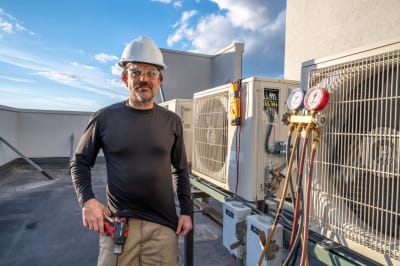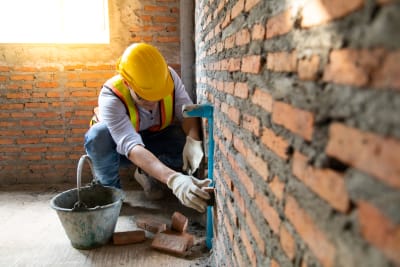Although the masonry profession involves a significant amount of physical demand, it is also highly technical, requiring critical thinking, strong interpersonal skills, and a problem-solving mindset. To ensure that aspiring masonry workers in West Virginia understand what is expected of them on their journey to enter this discipline, we have provided a detailed guide on this page.
The guide analyzes everything individuals need to do to prepare for their education, the types of training arrangements they can utilize for career opportunities, and the specific employment and career pathways they may pursue. It also includes sections discussing licensing and certification, as well as specific high-quality programs.
How to Become a Masonry Worker in West Virginia
Below are the key steps to becoming a successful masonry worker in West Virginia.
Step 1: Meet the Age, Education & Physical Requirements
It is common for training institutions and employers in West Virginia to set a minimum age requirement of 17 to 18 years old for prospective masons. A high school diploma or its equivalent, such as a General Educational Development (GED) certificate, is typically the minimum educational requirement for most positions. At the same time, candidates are also expected to be physically fit, given the heavy lifting involved in the day-to-day duties of a mason.
Step 2: Pursue a Masonry Education Program
Although a formal college education isn’t mandatory to start a career in masonry, many aspiring workers find value in completing a program through a trade school or community college. These programs offer structured, practical instruction and typically award a certificate or an associate’s degree upon completion.
Earning such credentials can enhance professional reputation and simplify the job search process. For those balancing other commitments, many schools offer flexible learning options—including evening and weekend classes, as well as hybrid formats that blend online and on-campus sessions.
Step 3: Gain Real-World Experience
Masonry workers can gain real-world experience during their training phase through apprenticeships and internships. Candidates are encouraged to consider apprenticeship programs if they prefer not to worry about tuition and would like to earn while learning.
Step 4: Starting a Career
After completing their training, fresh graduates can compile a resume and secure employment with construction and building companies. They can also leverage continuing education and certification to attain supervisory and master masonry or construction roles in just a few years.
Explore trades with similar paths:
Licensure & Certification Requirements
Licensing as a masonry worker in West Virginia is limited to professionals who will be working as contractors and taking on contracts exceeding $2,500. Professionals working under a contractor don’t need a license of their own.
Candidates seeking a contractor license must pass the state business and law examination.
It is common for masonry workers in West Virginia to pursue professional credentials, although it is not compulsory according to law. Credentials from the International Masonry Institute and the National Center for Construction Education and Research can lead to career growth through enhanced credibility and increased job opportunities.
Top Masonry Schools in West Virginia
The following are the top training programs for aspiring masonry workers in West Virginia.
James Rumsey Technical Institute
Martinsburg, WV Campus Only
James Rumsey Technical Institute offers a comprehensive masonry program that provides students with hands-on experience through real-world construction projects.
Tuition
Call for DetailsContact
(304) 754-7925 Ext:511
jlockhart@k12.wv.us
Academy of Careers and Technology
Beckley, WV Campus Only
The West Virginia Academy of Careers and Technology offers a structured masonry training program that spans two years, comprising 1,080 hours of combined classroom and hands-on instruction.
Tuition
Call for DetailsContact
(304) 256-4615
info@wvact.net
BAC West Virginia
Harrisville, WV Campus Only
Bricklayers and Allied Craftworkers chapter in West Virginia, in collaboration with the International Masonry Institute, offers a rigorous apprenticeship-based education designed to prepare candidates for long-term careers in masonry.
Tuition
Call for DetailsContact
(740) 629-7546
tim@wvbricklayers.org
Explore masonry worker schools in West Virginia by city:
Salary & Career Outlook
The highest-paying cities to work as a masonry worker in West Virginia include the following:
- Shady Spring, with an annual average salary of $71,714;
- Point Pleasant, with an annual average salary of $52,341; and
- Charleston, with an annual average salary of $50,747.
This data was obtained from a survey of professionals carried out on Indeed. It also showed that candidates can fall into any of the three categories when sorted without focusing on any singular criterion.
These include masonry workers in the bottom 10%, who make an annual average salary of $21,866; those in the top 10%, who make an annual average salary of $43,052; and individuals in the middle, whose annual average salary tends to be around $30,682.
Candidates typically move from the lower end of the salary spectrum to the higher end by achieving key performance metrics. These can range from experience and location to professional credentials, networking, and specific company of employment.





